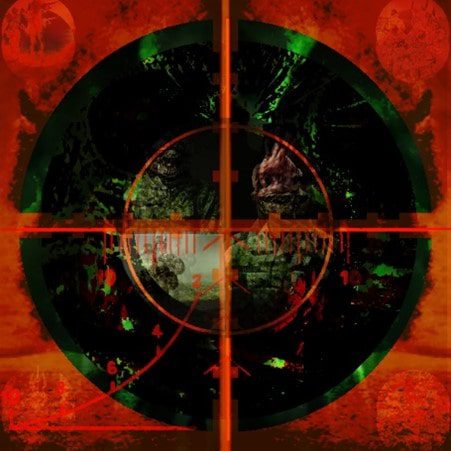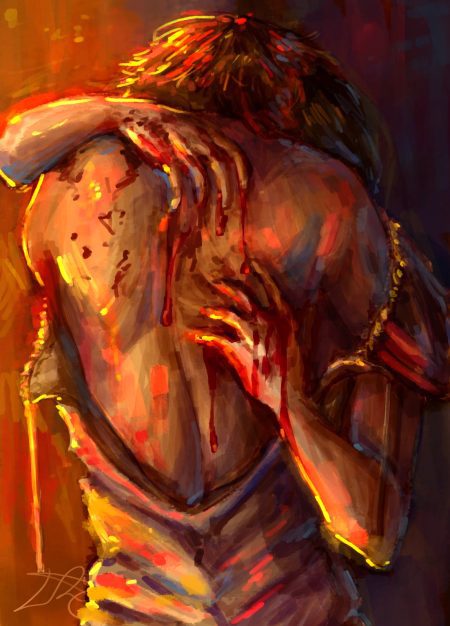by Luke Mcmenamin (he/him)
Artwork by Fina McDusa.
I heard a word recently, one of those words where, once you hear it, you feel a certain thing. You don’t know what the thing is, it’s like a blockage of some kind. Like if you imagine your head as made of little tubes and vents, a criss-cross of pipeline, it’s like you can feel one of those pipes stuck up with something. But that’s not doing the thing justice, there’s more. Bear with me here, it’s like the blockage in the tube in your head is fleshy, or like the skin of a drum stuck to the circumference of the tube, and you can feel the thoughts pushing against it. You can hear the drum skin muffle the thought behind it, and the thing, it’s pushed up against the skin so you can trace its outline with your eyes. A blocked engine, but it rhymes with you somehow? I heard the word on the radio, which is odd because I don’t listen to the radio when I’m driving at work, so I must not have been at work. But I’m never not at work.
I pass what I call the middle of nowhere – around where the 87 becomes the 308, next to the border of New Mexico. Dirt sprinkles between wispy grass out my window. The land reminds me of the forgotten, unkempt back of a balding head. I call it the middle of nowhere because that’s where I got the job; I remember thinking how this was an odd place for an interview. This patch of barely living land, in between places, not wanted by anyone except to travel across, briefly, and hopefully never come back over again, this is where I call home. So I arrive to the middle of nowhere, and parked right on the shoulder is this eighteen-wheeler, keys lazy on the passenger seat sheltered from the beating sun. The guy who took me out there, I thought him my boss at the time, didn’t say a word for the entire trip. I remember getting out of the car and hearing the uninterrupted breeze stumble by, then freeze, leaving the barren landscape without even a tune to listen to.
All the previous driver’s shit is spread out over the cockpit, no sign he ever intended to leave. I ask the guy if this happens a lot; he asks me does what happen a lot? People just pack up and leave mid-convoy? He tells me it happens, and that I’m lucky it did because I’m hired. Well, thanks for the great news, but where am I supposed to drive this thing. And what’s in it? I don’t want to be drive’n out here just for a cop to open up the back and find an entire frat’s house worth of cocaine. He tells me I’m driving electric cars from the factory across the border to New Mexico, then back to Austin so they can be sold. Why? He says it’s a legal thing and just to do it. A gas guzzler transporting the cars to save our future, aimlessly there and back again, so they comply with a statute; no car produced inside the state can be sold in the state. Heroic work, I’m saving the planet, a hundred and fifty gallons at a time.
Seven years later, I’ve changed the cockpit since then. It’s less trucker stop, more jazz hideout. Took down the crusty confederate flag and put up the sleeker, elegant tricolour. I did keep the keyring the way I found it though; a small surfboard from a beach in California dangles on one ring, and a metal block with the name and number of some bar in New York falls from an adjoining loop. I wonder if the fella who drove this heap back and forth before me went east or west when he got out of the driver’s seat, did he hitchhike, or did he have some savings, and this was just the end?
I’m number sixteen of about thirty. It’s lonely work – lonely, the word blocking me up rhymes with lonely – I’ve never spoken to the driver out the windscreen or the one in the wing mirrors; we’re not really allowed to talk with one another. Not that I think I’d be fired if I did, but I just always get the feeling that I’m not meant to. The trucking company is always empty when I go in for reviews, paychecks or whatever other business they need me for. It’s a big compound, on the outside tumorous, with wings growing from one another. The inside is filled with corridors and offices, but I never see anyone there. Once in a while, they call me in there to watch a two-hour movie on why not to attempt a handbrake turn in an eighteen-wheeler because some asshole recently killed an entire mariachi band on their way to perform in some highway bar while attempting one. I’m alone. Sitting in a dark room on a school chair, with the little desk attached to its frame. I watch the flotsam and jetsam of sand gently pass through the projector’s beams, aimless. I don’t work for the car company, and this place isn’t their homebase. The car/tech company’s base in Dallas has a pool, gym, and a slide that cuts diagonally through the floor and then winds around the edge of the building. I’m employed on a zero-hour contract, for a company that expects sixty more than that.
My conga line of steel strangers passes the border. I sometimes wonder why we don’t drive to Arkansas, Oklahoma or Louisiana, still, I’ve become accustomed to the antithetical ways companies operate, so we drive twice as long to New Mexico. A little further in, some paperwork waits, claiming that the cars were here. Once we have that, we can head back. The whole process takes a few hours. Sometimes I rest. Mostly, I watch the other worker bees flutter around, grabbing manifests, dotting i’s and crossing t’s. It unnerves me to see all these people, this conveyor belt of smoke, gas, churning engines and nameless meat sacks bouncing around as if they can’t control their own movement.
This time starts as any other. We draw into the ‘factory’, and the general perfunctory busyness begins. The anthill spews workers, and they begin seemingly trivial tasks. As far as I can tell, prefabs in the centre only house admin staff. The real value of this place is in the car park. Apparently, no oversight committee ever wondered why a factory with less than twenty employees, that doesn’t produce anything, needs enough space for thirty eighteen-wheelers out front. The car park itself is made from tire imprints and packed down dirt, it’s bumpy and I’d say in disrepair if I thought it could ever be repaired. It needs to be built in the first place. This is the most dangerous part of the journey, especially if we’re shipping overnight; a crushed leg or fender bender is hours from the nearest place equipped to deal with either.
Right now, the New Mexico sun beats down on the orange desert, and I park safely in a dirty column of other trucks. Nothings here except us, our trucks and the corral of pencil pushers zipping from truck to truck as if being gently carried down a switchback. Usually, they’re so lively, like a particularly pissed-off hive but this time I see something, I check to see if I saw it right, and before I know it, I’m sitting up straight, hand on my keys, pulling them from the ignition. What are they doing? A group of people gather behind one of the trucks, a mass of shoulders and grey sweat stains, backlit by the canvass of a truck’s trailer. A yellow high-vis stares dumbly into his clipboard at the back of the trailer. He drags his head upwards to face the open double doors at the back of the truck. Seeming to notice his stupor, he tries to awaken himself. Sharply he shakes a thought from his ears with the same motion a dog uses to expel water from its coat. His lethargic aura retreats, but then another wave gathers, and he throws the clipboard down and walks away, grappling with his high-vis jacket over his head. The huddled group don’t take any notice as I pile into the boundaries of their circle. Judging from the lack of yellow overcoats, these are probably my estranged colleagues. They look as I imagine, all men, bevvy white shirts, baseball caps and sunglasses. I’m probably the youngest here by a decade.
“When did they decide?” one man asks.
“Fuck does that matter?” an older man, leaning on one of the truck’s wheels, replies from under a flat cap. The crowd seems to gather around him. Another of the men beside me asks another question directed at the old man.
“Well, I imagine it means we’re out of a fucking job.” the old man says in return.
“What’s going on? Have some of the cars been stolen?” I ask.
The crowd parts, leaving a line of empty space between the old leader and me. The man’s eyes settle in my direction, they’re sharp and deep brown, the indents of cracked skin fork from them. He hums for a second.
“Take it you ain’t heard then, well, as I’ve said a few times to whichever ill-informed idiot needs to hear it, that billionaire fuckwit’s lobbying finally paid off. He can make and sell his overpriced future cars in Texas now. No need for us to ferry them out here to get the made-over-the-border stamp and then back. The state just closed the loophole. He can sell them without us, so we’re out of a job.”
“Have you heard from the office? Have they said we’re fired?” I reply, meeting his eyes with my own.
“Don’t need to.
“Well, last I checked, we’re in a job until someone says we’re not. That’s how most firings I’ve had go. Have they radioed?” I feel the crowd’s support, I’m wielding their scrutiny towards this confident old fool.
A smirk dances across the old man’s face, he expels air sharply in a pitiful laugh. The old man takes off his hat and wipes his stringy hair with the palm of his hand before fixing the cap back on.
“They ain’t radioed because they don’t want to hire thirty more drivers to drive their overpriced cars one way back to Texas. Look, we all know we ain’t supposed to talk to each other and I been okay with not having to. But the times come where when we get back, we’re gunna be fired. They don’t want ta’ fire us just yet on account of the roughly 800,000 dollars’ worth of lithium future we’ve been luggin’, so that gives us a unique opportunity. I propose we unionise, right here and now.”
A grunting laugh comes from the group of men, and I contribute to the noise.
“Don’t laugh, I’m fucking serious, the majority, if not all of us are gunna be fired, with nothing to show for it. Look, you might be too young ta’ remember, but there was a time when unionisation weren’t such a dirty word – ”
A few men peel off.
“I been driving for four years straight, never hit anything, never tried anything stupid, always been on time and ready. They’ll see that. I’ll be okay,” a driver shouts to groaning agreement from the crowd that’s beginning to slowly drift away. The old man lets out a hearty guffaw before coughing and spluttering into his cap.
“Leave the unionising to the commies. I have to look after myself,” someone else shouts.
“I’ve been driving here for fifteen years, been driving for these guys since they moved productions of these green cars inta’ Texas and needed the big deal engines to haul em two and fro.” The old man squeezes his counter-argument out, clearing his throat.
“Thirty years? You’ll definitely be okay,” I say.
“I’m fucking expendable” he looks dismissively at the dissipating crowd, then turns back to me. “Which truck are you?” he asks.
The question takes me by surprise, so much so that I spill my position in the convoy and plate number before I can catch myself.
“Yeah, figured as much, you’re the asshole in front of me who drives like he’s reading straight from the manual.”
“That makes you the asshole riding up mine all day and night,” I retort.
His chuckle’s like the revving of an old engine, starting slowly before gaining speed and volume and suddenly stopping.
“Show me your keys.”
Seeing my eyebrows furrow and the slight sideways nod of my head, he continues, “I knew the old number sixteen. He had these ring pendants – ”
I pull the keyring from my pocket and dangle them in front of the old man. His smirk returns.
“Hmm, he always said he wanted to go east or west.”
Intrigued by the old man’s upside-down ways, I engage, and before long we’re the only two left. “You know which way he went in the end?”
“No, personally, I hoped he’d go north or south instead. But that’s just it; ya get told there’s either east or west, keep in your lane, stay on the road we paved for ya. Even a smart kid like him couldn’t think of anything different than what been written for him. Shame his cab went ta’ – ”
“Oh c’mo – ”
The old man interrupts me as he hangs his head and raises his palm, cutting down any tirade I might embark on. He speaks with a sigh that tells me the last of his hope walked away with the crowd, honestly he tries to save one last potential believer.
“We’re getting chopped soon as we get back. No one’s getting anything more than their last paycheck because all you’re thinking about is whether ta’ go east or west. You think they’ll spare you, you, the benevolent worker? How they value you, eh?”
He pulls out his own set of keys. The rounded shape of a silver surfboard twinkles in the light, and the blue encrusted number of some bar in New York looks washed out by the harsh desert sun.
I laugh at the pitiful old prune as he bakes in the heat “you’ve got em too.”
“I’m too old, had my shot at going whichever way I wanted. I failed. Now look at me, for a second, I was going to try again. You think me a fool, and I am, but not for those reasons.”
He gets up, strides towards the front of the truck, opens the door, and tosses his keys into the passenger side. He puts his hand in his pockets, straightens out his back and becomes engulfed in the graveyard of idle trucks and sparkling high-visibility jackets.
Paperwork in hand, we’re sent back. My head splits, swimming with vague sentiments and sordid details of the future. There’s no way they’d fire me. What was that word? I can feel it flair in my throat. I’ve the feeling that if I’m to remember it, it won’t be by using my head. Thirty drivers, well twenty-nine now, let’s say they’ll keep three? Did it begin with a J? Jaaaaaay- sound? No. No, they’ll keep ten, so only nineteen drivers will lose their jobs. But what will I drive? Where? Lulllll- liiii- that feels familiar to my ears, something liii. I don’t know much about the trucking company, but it always seemed like their only customer was the electric car magnate himself. Limitations? Liquefaction? Licentious? No, nothing feels right. I’m close, warm, but not exact. They can’t fire me with the amount of time I’ve given to them. I stepped up when they needed someone to drive the last few miles to New Mexico. They know that. Who knows that? I know that word. Who knows that word? I don’t even know where I pulled the ten drivers who won’t be fired from. I rack my brain for something; any hint that what I do has value to them, suddenly, two unknowns collide, and I’m left unconsciously driving, knowing neither the word nor my value. We cross back into Texas. I still can’t think of a single reason why I should be saved out of the twenty-nine others. I’m a flyover state, a building as square and stout as any other. A few hours later, I radio someone at the depot. No answer. Then I try something that, if I’m being honest, would probably get me fired.
“Break 1-9 for a radio check. Can anyone else in convoy hear me? This is number sixteen calling in, for the first time, and maybe the last time, 10-65,” I laugh nervously over the radio.
No answer. Each of them is doing the math too; they figure it’s going to be them to keep the paycheck, their reasoning being that they need it more. But I need it too. I do everything, and feel nothing. Not that many of us know anything else. The guy in front of me indicates into the hard shoulder. I slow as the piercing of his indicator leaves an orange shadow in my eyes. I don’t think I’ll see him again, my view of seven years opens to an identical view, number fourteen. We’re only two hours from the depot, and they’re going to fire me the moment I step out of this cabin.
I wonder what number seventeen thought as he sees my blinker begin to flash in the cool red haze of a fine Texas evening. I step outside the cab and watch the space-white side of my truck dirtied by red silt tossed up from the ever-churning machine below. My co-workers pass by, still huffing the fumes of dreams kept from them. I see a small piece taken from each one, the time heading east or west without ever realising any other direction. How many of them are unmarried, divorced, happy? I’m one of those things, and I’m not proud of it. Eventually, the last of them passes, leaving a straight view onto the waning crimson sun and its subdued glow on the yellow, red and red of a variegated Texas horizon. I throw the keys in the cab. Maybe they’ll keep one or two of them on to come and get this magnificent growling beast. Back the way I came: California; the way I was going: New York. Maybe I’ll try north or south when I come to a crossway? I dive my hands into my pockets, and begin to walk.
I heard a word recently; finally, it cut through its barrier: liminal. It resonates deeply within me, I am a liminal person. My life has been caught up between money and politics, and I never realised it, without one and unwilling to take the other. I’ve been abandoned into the cracks. How does that happen?
Luke Mcmenamin
Luke Mcmenamin is a twenty three year old dyslexic writer, currently undergoing a master’s degree at Trinity College Dublin. More of his work will be available in Ontology Books’ horror anthology, A Darkness Visible: Explorations of Horror in the Postmodern in mid-2023. He can be found – infrequently – @lukemcmenamin on Instagram.



